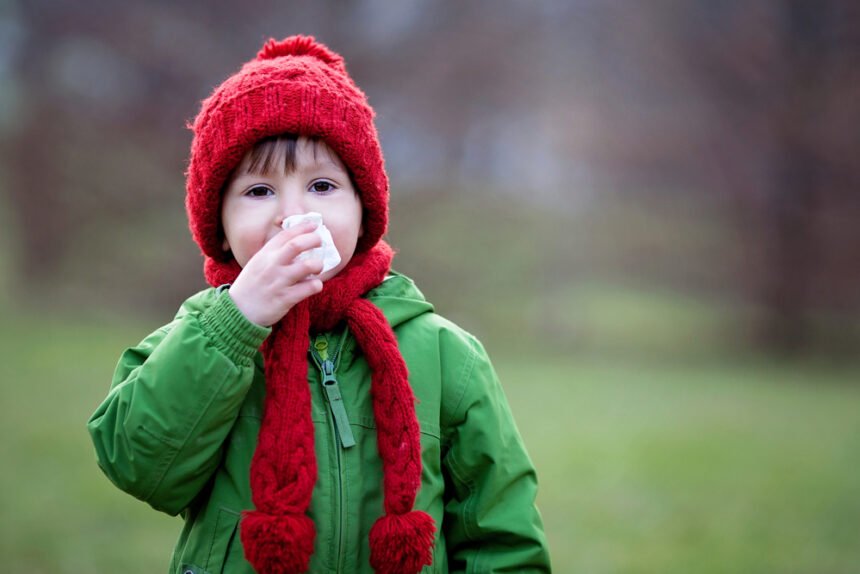Parents can keep their kids healthy and well by understanding how to protect them from winter allergies.
Physicians diagnose a growing number of children with seasonal allergies. They can result in more than just the sniffles, however. In some instances, seasonal allergies can cause children to experience life-threatening allergic reactions.
There’s almost nothing worse than the feeling of your immune system turning against you by releasing antihistamines that set in motion a series of dangerous physiological responses. By understanding seasonal allergies, you can protect your child from scary and life-threatening anaphylactic reactions.
What to Look Out For
Eight foods make up 90% of all food allergies. It’s a pretty straightforward task to protect kids from them. Seasonal allergies, however, can prove a bit trickier to avoid.
In the past, parents only had to worry about seasonal allergies in the spring. Today, however, other seasonal allergies are just as threatening – if not more so.
In the spring, trees can trigger allergic responses. In the summertime, the grass is more of an issue for allergy sufferers, and fall, weeds and mold can pose a severe threat to your child’s health. Even though the freezing temperatures bring an end to seasonal pollen allergies, the indoor threats during the winter can be just as harmful.
Common symptoms of indoor, winter allergies include sneezing, runny or stuffy nose, coughing, itchy eyes, nose and throat.
Staying Informed About Local Seasonal Allergy Threats
Smartphone apps are a great way of staying on top of the local pollen count. The WebMD Allergy app, for instance, enables you to track ongoing allergy reports. You can also browse informative articles, tips and videos using the app.
The WebMD Allergy app also allows you to keep an allergy journal. You can use it to track when your child is affected by allergy symptoms, and you can share that information with your child’s pediatrician to inform appropriate interventions.
In addition to tracking the pollen count, the Zyrtec AllergyCast app allows you to monitor the local allergy impact. The app uses information gathered from other users about their allergy-related symptoms to analyze and report the impact of the local pollen count. You can also program AllergyCast to alert you when the pollen count is dangerously high.
Finally, the Allergy Alert app by Pollen.com is an advanced allergy tracking program for your smartphone. It enables you to view detailed information about the top respiratory irritants in the area. You can also program allergy alerts for multiple regions to keep your child safe when your family travels.
Keeping Kids Safe During Allergy Season
Relatively recently, there’s been a growing number of children going to the emergency room because of seasonal allergies. It has increased awareness of the threat that seasonal allergies can pose for children. Resultantly, more parents have learned to note the potential signs of anaphylactic shock and how to use epinephrine injectors in an emergency.
A severe reaction to seasonal allergies can occur anytime and anywhere. However, most severe allergic reactions happen outside of the home because parents take measures to ensure their residence is free of threats. Resultantly, parents must remain vigilant about understanding environmental threats wherever their children may spend time outside of their home, whether it’s in school or after school.
Winter Allergy Tips
In order to combat winter allergies, try to keep the humidity in your home below 50% to reduce dust mites. Our furry friends are part of the family but they may also be part of the problem. Try to minimize contact between your kids and their pets and try to restrict them to certain areas of the house to reduce the amount of allergens in the bedroom. Alternatively, you can bathe your pets weekly, to wash away allergens from their fur.
Frequently cleaning the house is another key to preventing winter allergies from getting out of hand. Use a damp mop for hardwood floors. It’s important to clean frequently especially on wet surfaces like the bathroom and kitchen.
And most importantly, keep yourself and your kids clean! Change your kids’ clothes frequently, bath and wash your hair after playing with your pet, and wash bedding once a week to reduce dust mite load in the bedding.
According to Bridget Welker, assistant professor in the online nursing program at Bradley University, the most important thing is to know your child’s triggers. With the tractors in the fields and the raking and burning of leaves, the environment becomes full of dust, pollens and molds that stir things up.
“As a preventative, I tell parents to keep the window closed. At night, make a routine of showering, washing hair and using normal saline in each nostril followed by blowing, to remove all the allergens that might have collected in the nasal passages during the day. You will want to wash pillow case and bedding frequently. If symptoms start to develop, (runny nose, congestion, runny/itchy eyes) the over the counter nose sprays like Flonase, Nasacort or Nasonex will help,” says Welker.
Teach Your Kids About Allergies
It’s also critical that children with allergies understand their condition and what to do in the event of an emergency. They must feel comfortable telling an adult about a potential allergic reaction at the first sign of trouble.
Children with allergies or asthma face an increased risk of anaphylaxis because of their hypersensitive immune systems. Furthermore, children who’ve experienced anaphylaxis – even mildly – face a higher risk of a repeated episode, and the next round could prove more intense. Resultantly, parents of children with a history of anaphylaxis should always have an epinephrine pen on hand.
Today, parents must juggle a range of responsibilities, from ensuring that children receive proper education to helping them cope with anxiety. Nevertheless, parents of children who have allergies must remain hypervigilant. It’s safer to remain overprotective about seasonal allergies than it is to not worry about them enough.
Seasonal allergies pose a serious threat to children. However, with an understanding of allergies and an awareness of what to do in the event of an emergency, you can prepare yourself and your child to respond to seasonal allergy triggers quickly.









